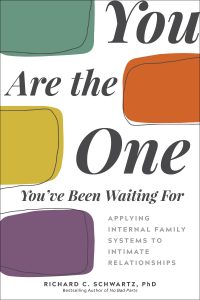It’s my first session with Kurt and Marissa. Marissa breaks the early tension by stating that they are desperate and I may be their last hope. They have been miserable for four years and have gone through three other marital therapists as well as several weekend retreats for couples. Religiously they practice the communication skills they have been taught and sometimes find them helpful in the moment, but the structure falls apart once either of them touches a sore spot in the other. In therapy they have even found livable compromises to several chronic issues, but their overall dissatisfaction with each other hasn’t really changed.
Kurt concurs, adding that he feels helpless and despairing. He’d had many relationships but waited to marry until he felt totally sure that he’d found the right partner. He says, “We were so in love, have so much in common, and are both intelligent. Why isn’t this working? I’ve always succeeded in my life. When I find something I want and work hard to get it, I succeed. When I face a problem head-on, I can solve it. This marriage thing is my one big failure.”
There are many couples like Kurt and Marissa. Earnestly battling the demons that our culture and its relationship experts implicate, such as poor communication and lack of empathy, they feel bloodied and beaten by their inability to make it work. They alternate between blaming each other and themselves for not being able to bring harmony into their homes and satisfaction to one of the most important relationships in their lives.
What if the premise itself is to blame? What if there were no way that Kurt and Marissa could succeed, no matter how perfect their communication or how much they compromised and empathized? Couples are told that if they could just accommodate each other enough, they would be happy. Each partner is asked what they need from the other, and therapy is designed to find ways that each can change to meet the other’s needs. What if there is an essential flaw in this accommodation premise that sets up couples to fail?
I believe that there is. Conditions exist within each partner and in the context of their lives that, if left unchanged, will preclude finding the intimate, mutually supportive, and respectful connection they crave. This book will describe those conditions and offer a clear path to changing them. It will help couples replace the controlling, dependent, possessive, or distant relating they have come to expect and dread with something I call courageous love.
When each partner has courageous love for the other, many of the chronic struggles most couples face melt away because each partner is released from being primarily responsible for making the other feel good. Instead, each knows how to care for their own vulnerability, so neither has to force the other into a preconceived mold or control the other’s journey.
Courageous love involves accepting all parts of the other because there is no longer a need to keep the other in the confining roles of parent/redeemer/ego booster/protector. The other senses that acceptance and freedom, which feel wonderful and unusual to them. They come to trust that they don’t have to protect themselves from you and can keep their heart open.
Thus this ability to care for yourself emotionally permits the intimacy you seek because you have the courage to allow your partner to come close or get distant without overreacting. With less fear of losing or being hurt by your partner, you can embrace them fully and delight in their love for you. Is this a far cry from your experience of relationship? Are you thinking, That sounds nice, but where am I going to find someone who is evolved enough to treat me that way? You may not have to look as far as you think. If you and your partner can take what I call a U-turn (you-turn) in your focus and begin to relate differently inside yourselves, you will each find that courageous love becomes a spontaneous way of life rather than something you must strive to achieve. You will also find that your partner doesn’t have to take care of you because there is so much support you can get from yourself. In our second session, I proposed to Kurt and Marissa that they take that U-turn, and they reacted the way most couples do initially. Marissa said, “I’m willing to look at my part in this, but what about the way Kurt digs at my self-esteem? It’s a rare day when he doesn’t find something to criticize.” Kurt was equally resistant: “Am I supposed to work on myself, so I just accept Marissa’s lack of interest in sex? Do you expect me to be okay with a sexless marriage?”
What I propose in this book is a hard sell in Western culture. We are primarily oriented toward getting from our partners what we need to feel good and don’t believe we can get much from ourselves. We want to transform the source of pain in the outside world rather than the source within us. That external focus—and the therapies of accommodation that subscribe to it—will only provide temporary relief at best from the inner and outer storms that gradually erode the fertile topsoil of our relationships. There is another way, and we will explore it in this book.

